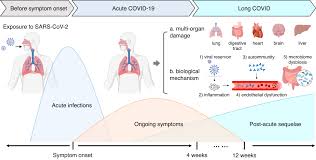Link Between Long COVID and Cardiovascular Symptoms Revealed by University of Queensland Research

Research led by the University of Queensland has uncovered elevated inflammatory markers in the blood of long COVID patients, potentially explaining the ongoing cardiovascular issues many experience. Associate Professor Kirsty Short noted that the team aimed to investigate the causes of persistent chest pain and heart palpitations commonly reported by long COVID sufferers.
"We discovered elevated levels of cytokines—proteins that help regulate inflammation—in the blood samples of individuals approximately 18 months post-infection with SARS-CoV-2," Dr. Short explained. Lab studies indicated that these trace-level cytokines directly impacted the functionality of cardiomyocytes, the heart cells responsible for its pumping action. "These specific types of cells are fundamental building blocks of our heart, so any damage to them can lead to cardiovascular symptoms."
Dr. Short emphasized that the role of chronic inflammation in cardiovascular symptoms had remained unclear, particularly for individuals exhibiting symptoms more than a year after infection. The study involved analyzing the blood of 50 participants from across Australia who either suffered from long COVID for over a year, had recovered from COVID, or had never been infected with the virus.
Using 'immuno-storm chip' nanotechnology developed at UQ's Australian Institute for Bioengineering and Nanotechnology (AIBN), researchers detected trace elevated cytokines in the long COVID group, as well as cardiac tissue damage markers measured at single-molecule resolution in blood samples.
Dr. Short cautioned that these findings are preliminary and require validation in additional patient cohorts, particularly those infected with more recent SARS-CoV-2 variants. "We’re now eager to explore whether our findings could extend to other long COVID symptoms, such as neurological or respiratory issues, as our study specifically recruited individuals with chest pain and/or heart palpitations," she said.
Despite the study's limitations, Dr. Short believes the research provides vital new insights into this complex disease, potentially improving the diagnosis, treatment, and understanding of long COVID.
The study was led by UQ PhD candidates Jane Sinclair from the School of Chemistry and Molecular Biosciences (SCMB), Courtney Vedelago from AIBN, and Dr. Feargal J. Ryan from the South Australian Health and Medical Research Institute. This collaborative research involved multiple UQ departments, including SCMB, the School of Mathematics and Physics, AIBN, the Institute for Molecular Bioscience, and the Faculty of Medicine, along with various institutions including Flinders University and QIMR Berghofer Medical Research Institute.
Blood samples were provided by the COVID OZGenetics study, the Central Adelaide Health Network, and the David Serisier Research Biobank at Mater Research. The research findings were published in the journal Nature Microbiology.
Story Source:
Materials provided by University of Queensland. The original text of this story is licensed under a Creative Commons License. Note: Content may be edited for style and length.
Journal Reference:
- Jane E. Sinclair, Courtney Vedelago, Feargal J. Ryan, Meagan Carney, Meredith A. Redd, Miriam A. Lynn, Branka Grubor-Bauk, Yuanzhao Cao, Anjali K. Henders, Keng Yih Chew, Deborah Gilroy, Kim Greaves, Larisa Labzin, Laura Ziser, Katharina Ronacher, Leanne M. Wallace, Yiwen Zhang, Kyle Macauslane, Daniel J. Ellis, Sudha Rao, Lucy Burr, Amanda Bain, Anjana Karawita, Benjamin L. Schulz, Junrong Li, David J. Lynn, Nathan Palpant, Alain Wuethrich, Matt Trau, Kirsty R. Short. Post-acute sequelae of SARS-CoV-2 cardiovascular symptoms are associated with trace-level cytokines that affect cardiomyocyte function. Nature Microbiology, 2024; DOI: 10.1038/s41564-024-01838-z

0 Comments